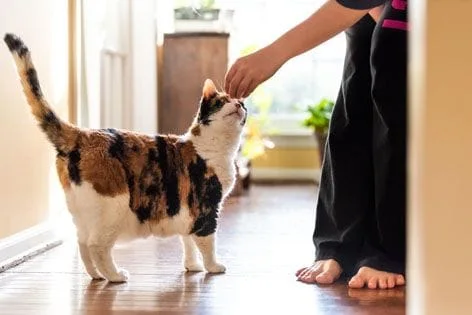Behavioral Counseling at Anderson Feline Veterinary
Our veterinarian near San Diego offers behavioral counseling for kittens and cats.
Does your cat have behavioral problems? Cats often develop bad behaviors that frustrate their owners, like yowling, scratching the furniture, being aggressive and using the bathroom in places other than the litter box. Thankfully, these problems can be addressed with feline behavioral therapy at Anderson Feline Veterinary.
Common Behavioral Problems in Cats
- Aggression between cats in multi-cat households
- Aggressive behavior from your cat toward members of your family
- Loud meowing and yowling
- Not using the litter box reliably
- Scratching your furniture, walls, carpet and screen doors
Correcting Bad Behavior with Feline Therapy
Feline therapy at Anderson Feline Veterinary always starts with ruling out medical issues that could be contributing to your cat’s bad habits. For example, an older cat with arthritis may not be able to get in and out of the litter box. If you haven’t had your cat spayed or neutered, that could be contributing to his or her aggressive behavior.
Once all the medical issues have been identified and treated by Dr. Natasha Anderson, your cat’s environment may need to be adjusted or his or her food may need to be changed to a brand that offers better nutrition.
When we talk about adjusting your cat’s environment to correct bad behavior, we objectively examine the behavior to be corrected and provide the most likely solutions. This could include more scratching posts in your home to deter your cat from scratching your furniture and walls.
Cats are also solitary creatures and they prefer high places. In order to give your cat a place where he or she feels safe, elevated cat beds may be the answer. If your cat acts out due to boredom, providing your cat with more opportunities for exercise and playing with your cat more often may be the answer.
When we talk about cat nutrition and bad behavior, we are talking about adjusting your cat’s food so that it provides your cat with the best ratios or protein and carbohydrates. It’s important to understand that cats need a diet high in protein, which often comes from meat sources. If we suspect part of your cat’s behavioral issue comes from a bad diet, we will recommend alternative food options to help improve your cat’s health and behavior.
The good news is that bad behavior in cats can be corrected with enough time, patience and professional help. This is why Anderson Feline Veterinary now offers behavioral therapy for felines.
Behavioral Therapy at Our Veterinary Practice
While it may be tempting to schedule an appointment with someone who claims to be a ‘cat whisperer’ or behavioral therapist for cats, you should always start with a licensed veterinarian, like Dr. Natasha Anderson. This is because we can rule out any health problems that may be causing your cat to display behaviors that are frustrating.
Arthritis can prevent your cat from being able to get into and out of the litter box. Aggressive behavior may be due to pain from an infected tooth or another hidden injury. If there are no hidden injuries or conditions, our vet can help you correct bad behavior by explaining normal cat habits and abnormal cat habits as well as provide you with tips and tricks to keep your cat active so that he or she does not act out in boredom.

